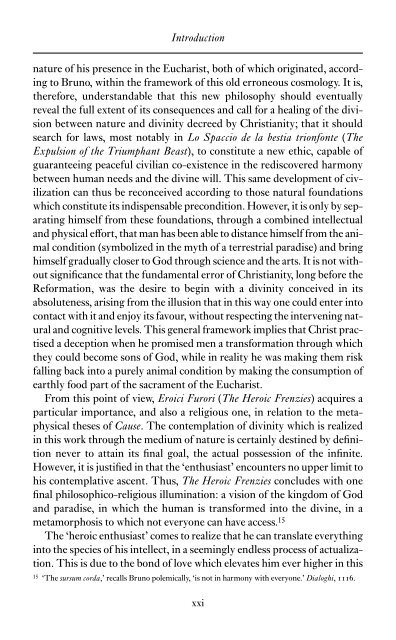Create successful ePaper yourself
Turn your PDF publications into a flip-book with our unique Google optimized e-Paper software.
Introduction<br />
nature of his presence in the Eucharist, both of which originated, according<br />
to Bruno, within the framework of this old erroneous cosmology. It is,<br />
therefore, understandable that this new philosophy should eventually<br />
reveal the full extent of its consequences and call for a healing of the division<br />
between nature and divinity decreed by Christianity; that it should<br />
search for laws, most notably in Lo Spaccio de la bestia trionfonte (The<br />
Expulsion of the Triumphant Beast), to constitute a new ethic, capable of<br />
guaranteeing peaceful civilian co-existence in the rediscovered harmony<br />
between human needs and the divine will. This same development of civilization<br />
can thus be reconceived according to those natural foundations<br />
which constitute its indispensable precondition. However, it is only by separating<br />
himself from these foundations, through a combined intellectual<br />
and physical effort, that man has been able to distance himself from the animal<br />
condition (symbolized in the myth of a terrestrial paradise) and bring<br />
himself gradually closer to God through science and the arts. It is not without<br />
significance that the fundamental error of Christianity, long before the<br />
Reformation, was the desire to begin with a divinity conceived in its<br />
absoluteness, arising from the illusion that in this way one could enter into<br />
contact with it and enjoy its favour, without respecting the intervening natural<br />
and cognitive levels. This general framework implies that Christ practised<br />
a deception when he promised men a transformation through which<br />
they could become sons of God, while in reality he was making them risk<br />
falling back into a purely animal condition by making the consumption of<br />
earthly food part of the sacrament of the Eucharist.<br />
From this point of view, Eroici Furori (The Heroic Frenzies) acquires a<br />
particular importance, and also a religious one, in relation to the metaphysical<br />
theses of <strong>Cause</strong>. The contemplation of divinity which is realized<br />
in this work through the medium of nature is certainly destined by definition<br />
never to attain its final goal, the actual possession of the infinite.<br />
However, it is justified in that the ‘enthusiast’ encounters no upper limit to<br />
his contemplative ascent. Thus, The Heroic Frenzies concludes with one<br />
final philosophico-religious illumination: a vision of the kingdom of God<br />
and paradise, in which the human is transformed into the divine, in a<br />
metamorphosis to which not everyone can have access. 15<br />
The ‘heroic enthusiast’ comes to realize that he can translate everything<br />
into the species of his intellect, in a seemingly endless process of actualization.<br />
This is due to the bond of love which elevates him ever higher in this<br />
15 ‘The sursum corda,’ recalls Bruno polemically, ‘is not in harmony with everyone.’ Dialoghi, 1116.<br />
xxi

















